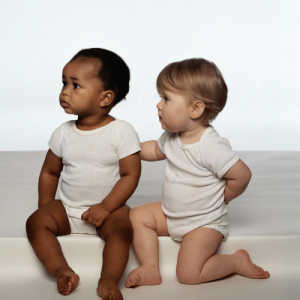In this text, I have chosen to talk about the psychosexual development of children aged 0-5. Recently, a particular situation has led me to deepen my reflection on this subject. I questioned myself about the normality of certain behaviors and I noticed that I had a lack of knowledge on this subject. I read articles, watched vidéos and consulted extraordinary people in social services and at Marie Vincent Foundation who helped me consider the situation objectively.
Above all, I understood that my adult gaze can skew certain observations and bring me a slight uneasiness. I realized that it is important to always keep in mind that children’s psychosexual development has nothing to do with our mature adult desires. That it has to be considered normal and necessary for the development of small human beings. Curiosity motivates small kids to want to explore how the body of the other is different from theirs. Therefore we must be present as adults, educators and teachers to ensure that all these discovery opportunities are done in a healthy way and with respect for oneself and others.
Consent and intimacy
A few weeks ago, I wrote a text concerning specifically consent and intimacy in early childhood so I will write partially about these subjects. If you want more details, you can go check it https://natis.ca/en/teaching-consent-in-early-childhood/
The psychosexual development of children is inseparable from consent and privacy. These three concepts are closely related. When the time comes for the little ones
to discover each other’s body, to recognize the difference between boys and girls and to understand which gender they belong to, it is essential to discuss consent and intimacy with them. Children must learn to develop their judgment. They should understand the importance of getting the other’s consent for any physical contact including hugs and kisses. It is essential to develop a bond of trust with your group so they will all feel secure to come to you or to another meaningful adult when they need it. They have to be taught that no one has the right to touch them if they don’t want to, even their friends and the adults around them. As educators, we also have a responsibility to teach kids to accept a refusal from others. Moments in life that affect psychosexual development should include learning about intimacy as well. Children’s questions must be answered according to their stage of development and these discussions must take place as early as possible in their life.
In 0-12 months
Infants explore their environment with all of their senses and especially with their mouth. They look, smell, and touch what surrounds them. They need to feel softness on their skin by pleasant touches such as massage and physical contact with adults. They love to suckle and to be breastfeed by their mothers. They often put their hands to their mouth, and some will even suck their thumbs. Of course, the body awareness is not present yet, but they are discovering new sensations every day. To help them understand their surroundings, you can provide them with sound toys and sensory objects. Natis’ sensory book or the multi-textures cover for nap time can help meet these needs for senses discoveries.
See our products for 0-12 months
The multi-textures & photos album
The multi-textures cover for nap time
Between 8 and 11 months, some babies will discover their genitals. When changing diapers or in the bath, it is not uncommon to see some of them touching their vulva or penis. Sometimes boys will even get erections. These are not stimulated by sexual desire as in adults but rather by a natural reflex called spontaneous erection. These occur when boys touch their genitals.
Between 12 months and 2 years old
It happens for babies this age to rub on blankets or soft toys or even on our thigh while they sit on us. They can also rock back and forth to provoke skin contact with their genitals in the diaper. It gives them appeasement, comfort, and pleasure. These behaviors are normal but should not take up all the space in a child’s play. When self-stimulation takes up too much of a baby’s play time, propose other activités to change his mind. Self-stimulation (infantile masturbation) appears between 18 and 24 months and sometimes earlier. They will often indulge during nap time or calm activities in the day. Take the opportunity to explain them that this should preferably be done in places that allow privacy for example when they are alone in their room, or on their sleeping mattress for a short period of time. For those who are too young to understand, just propose another activity.
Self-stimulation can be allowed for a little while at the beginning of nap time, but it is important that the child rests too. Since it is a way to relax and calm down, there are little ones who fall asleep after a few minutes. For those who stay awake auto-stimulating, stay calm, smile and sit next to them to help them fall asleep. You can tell them that they can continue tomorrow but now, it is time to rest. Of course, if you are uncomfortable with this behavior, do not show it and try to remove your adult glasses, remembering that it is normal. Don’t worry for the other children in the group, It is not contagious. They won’t all start doing it.
Between 12 months and 2 years old, we can start to teach children to recognize all the parts of their body and to name them without discrimination. Above all, the right terms must be used. A penis is a penis, and a vulva is a vulva and nothing else. Genitals are no different from other parts of the body for a child. Naming genital organs by their real name puts them on an equal footing with the rest of the body and marginalizing them. It makes the genitals just as ordinary as the rest of body parts. It’s the best way to build a healthy body image.
Between to 2 and 3 years old
When children gain control of their sphincters, they start wearing underwear instead of diapers and experience new sensations. They are more often exposed to their friend’s nudity and theirs. They notice other people’s bodies. The period of toilet training is major. It is a pivotal moment in the life of the little ones. Do not rush or force this step to avoid trauma or longer toilet training. The boys will arrive later to that step than girls. Male’s sphincters being in penis, out of the body, control is harder to acquire.
Make sure you place the potty in an intimate place like the bathroom or an intimate corner in your daycare room. Preschoolers do not yet understand decency and will not be uncomfortable being naked. It’s our role as professionals to make them understand that there are specific places where nudity is allowed.
Children who are 3 years old begin to understand gender differences. They recognise the differences between boys and girls. They will also begin to identify with and imitate adults of the same gender.
Between 3 to 5-year-old
Now aware of their body identity and their gender, they will want to discover the differences and similarities present in their peers. This is when they will want to show off their bodies and look at other people’s bodies. They may also be tempted to touch their friends’ genitals. You must remain vigilant and supervise these games. If you see situations where exploration games are not limited to looking or touching, or there is coercion or aggression, keep your eyes open. Especially if these inappropriate behaviors continue after discussion with the child about privacy and consent. A child should not reproduce sexual acts belonging to the adult world, use words related to it or attempt to insert objects into their genitals. If you have any concerns particular situations or inappropriate behaviors in your daycare, schools or family environment, do not hesitate to look for resources that can answer your questions, such as public services, the Marie-Vincent foundation mentioned above or any other professional available in your professional environment.
Between 3 and 5 years, questions about procreation will appear. Respond with facts by explaining the real things and using the exact terms. Do not go further in your answers than what has been asked. Often, your little ones will be more interested in what surrounds the babies growing up in the mother’s tummy than in the sexual act. Of course, it is better to stick to simple explanations that correspond to the development and maturity of the children in your group. There are some interesting books that can be used to support your interventions. Jocelyne Robert’s book is very good.
http://www.editions-homme.fr/sexualite-0-6-ans/droits/9782761942928
When observing play role games at this age, you realize that small kids reproduce the behaviors they observe at home or in society. Be sure to offer games that don’t reinforce gender stereotypes and let children freely explore all toys regardless of their gender. For children aged 3 to 5, gender equality is still present. This age is ideal for discussing the different types of families: traditional, homoparental, single-parent, multicultural families, and others.
Question yourself to move forward
It is possible that this text will lead you to a personal reflection. That it creates questions about your values, your limits and your discomfort with certain behaviors related to the psychosexual development of children. Like me, you may find that your adult glasses are changing the perception of what is normal in children. As children in your preschools begin to explore their bodies, keep in mind that sexual games are motivated by curiosity. If some aspects of psychosexual development discussed in this text are shaking you a bit, take time to go through this questioning process to better understand your feelings. Read and educate yourself. The more you understand, the more you are comfortable.
Talk to you soon
Nathalie Lizé
educational support consultant, childcare educator, and family coach




